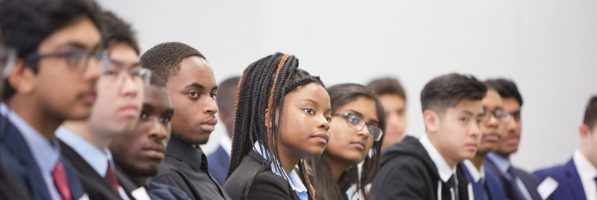The Connection Between Social Mobility and Democracy, and More – Chicago News

Let’s explore some of the most interesting stories that have emerged from Chicago business schools this week.
Is Social Mobility Essential to Democracy? – Kellogg Insights
Northwestern University Kellogg School of Management professor of managerial economics and decisions sciences Georgy Egorov, along with MIT Sloan’s Daron Acemoglu and Chicago Booth’s Konstantin Sonin, recently created a model to understand how voters’ beliefs about social mobility affect their political preferences.
Despite older generations becoming increasingly less optimistic with the potentially positive outcomes of future generations, the researchers find that there’s a decent probability that the children of future generations will rise to a higher economic and social class.
“Having many election cycles means that even with low mobility, the likelihood that a person’s decedents will eventually end up in another class is high. Egorov compares it to two lakes connected by a narrow straight. In the short term, they will not exchange much water. But over the long term, that small exchange will grow and grow until the waters are quite mixed.”
Speaking with Kellogg Insights, Egorov elaborated:
“In a certain sense, expectation of stability begets stability. A thick middle class makes democracy more stable than a thin one. Our research highlights the problems that may follow from a shrinking or thin middle class. Additionally, if the belief in the stability of democracy is undermined, people might well decide it’s not worth defending.”
You can read more about the trio’s research here.
Mendoza Marketing Professor Wins Research Award – Mendoza Ideas & News
The 2018 Louis W. Stern Award has officially been bestowed upon Shankar Ganesan, the John Cardinal O’Hara, C.S.C., professor of business and marketing department chair at the Notre Dame University Mendoza College of Business.
The award recognizes Ganesan, as well as co-authors Steven P. Brown of the University of Houston, Babu John Mariadoss of Washington State and Hillbun (Dixon) Ho of University of Technology Sydney for a 2010 article they published in the Journal of Marketing Research entitled, “Buffering and Amplifying Effects of Relationship Commitment in Business-to-Business Relationships.”
According to the article, “The paper examines the buffering and amplifying effects of relationship commitment on organizational buyers’ intentions to switch suppliers when a relationship is strained by the incumbent’s own misbehavior. “
Check out more from Ganesan’s research here.
The Road Ahead: Takeaways from Economic Outlook 2018 – Chicago Booth Magazine
Chicago Booth Magazine recently dove into the sold-out ‘Economic Outlook 2018’ event last January to “evaluate emerging trends [and] share their insights into the economic outlook for Wall Street and Main Street—ten years after the financial crisis.”
Randall S. Kroszner, the Chicago Booth Norman R. Bobins professor of economics, offered a few optimistic projections:
“I do think [the tax cut] is going to have a positive impact, both in the short run and the long run. I think the broad direction is fairly clear: cutting personal tax rates on a weighted average, of about three percent or so, will have positive impact on demand, because that’s going to allow for higher disposable income in the short run.”
Austan D. Goolsbee, Robert P. Gwinn professor of economics and the former chairman of the Council of Economic Advisers, offered slightly more tempered but optimistic projections as well:
“The danger areas continue to be worries about China, where there has been a big acceleration of debt, and a nagging feeling that we really don’t know what’s in the European financial institutions. That said, the overall growth around the world is looking a little better, for the first time in a little while.”
You can read more about Booth’s ‘Economic Outlook 2018’ overview here.
What Is Your 2018 MBA Resolution?

For those who aren’t in a post-New Years Eve hibernation, 2018 is here, and that means actually following through on all those promises you hastily made an hour before the year officially began—including your 2018 MBA resolution.
You and every other person in a five mile radius will pack your preferred gym for the next few weeks, dutifully following through on the promises they made themselves. And while the frustration of waiting, waiting, and still waiting for the bench press to open up is inevitably going to sit in, you still have an opportunity to utilize that newfound resolution energy into your MBA degree.
Start of this new year by forming productive habits, achievable goals, and a vision of where you want to end up! #MondayMotivation pic.twitter.com/igYQmNtI3C
— FOX MBA & MS (@FoxMBA) January 2, 2018
But, where do you start?
2018 MBA Resolution Baby Steps
Ordering a multi-thousand dollar exercise bike at the stroke of midnight might have been a more curious impulse, but there are plenty of non-expensive efforts you can make going into a brand new year.
The MIT Sloan School of Management revealed some of its favorite books from the previous year from its distinguished faculty and alumni, including the timely “The Power of Little Ideas: A Low Risk, High Reward Approach to Innovation,” by senior lecturer David Robertson. Which, in itself, can provide a powerful set of ideas to harness that newfound resolution energy.
Looking to up your tech-savvy skillset? Head over to Product Hunt, which provides an impossibly lengthy list of new apps and tools from startup companies that can do almost everything: from learning valuable developer tools to reforming your daily task routine.
Be Wary of Impossible Goals
According to Chicago Booth behavioral science experts, people don’t tend to follow through on grander resolutions.
“‘The problem with big resolutions is that motivation tends to wane over time,’ says Chicago Booth’s Ayelet Fishbach, who studies motivation and decision making. People start out strong, but then reality sets in as they realize it’s easier to set goals than to carry them out. ‘The problem with persisting is that our priorities change in the course of a day, a week, a year,’ says Fishbach. We may wake up in the morning determined to watch what we eat, but by the afternoon, we’re distracted—and start snacking again. Or we may feel determined to invest more time in relationships, but that slips our mind when an important work deadline looms. ‘Successful goal pursuit,’ she says, ‘requires employing strategies that keep us on track as our priorities momentarily shift away.'”
An important part of Fishbach’s research revealed that setting more frequently occurring goals is important to stay on track. This means, “Instead of an annual goal, set a monthly goal. Instead of weekly, make it daily.” When more smaller, reasonable projects are completed, the end goal is more probable. And the more probable a goal is, the greater the motivation, according to Booth marketing professor Oleg Urminsky.
“Proximity to the goal increases motivation. If you’re a rat in a maze, you run faster the closer you get to the end.”
Embrace The Eventual Setback
Anyone who has gone through a diet is more than likely familiar with the concept of a cheat day. While scouring cake one week into your shiny new diet may feel like a small failure, it doesn’t mean it’s time to give up.
According to marketing researchers Marissa A. Sharif and Suzanne B. Shu, authors of the 2017 study “The Benefits of Emergency Reserves: Greater Preference and Persistence for Goals That Have Slack with a Cost” in the Journal of Marketing Research, having a few “mulligan” occurrences is normal and should not deter your overall aim.
“What this suggests is that the perfect goal to set for yourself is probably a tough one but with the explicit allowance for a mulligan or two so you won’t be discouraged by the occasional slip up,” writes Washington Post reporter Katherine L. Milkman.
It’s Time To Go After That MBA
We at MetroMBA may be vocal advocates of an MBA, but numbers speak for themselves. MBA salaries at the top schools in the world hit a record high last year, according to the Financial Times, sitting at an eye-popping $142,000 USD average by the start of 2017—a $7,000 jump from the previous year.
Some of the world’s biggest companies, such as Amazon, are on MBA “hiring sprees” as it rapidly expands its business, indicating the increasingly high demand for graduates.
And if all else fails, just embrace it!
I don’t like New Year’s Resolutions. At all. In fact, I vow to get fatter, more deceitful, spend more frivolously, and enter more toxic relationships. These are my New Year’s Regressions.
— ShinigamE (@WWEBigE) January 1, 2018
Delaware Professor Warns Consumers About Store Promotional Credit

Despite the proliferation and ease-of-access eCommerce presents, many consumers still opt to wait in lines for hours, navigate packed parking lots, and push through herds of consumers to get Black Friday discounts. Thanks to research from Adnong Cheng, Assistant Professor of Marketing at the University of Delaware’s Alfred Lerner College of Business and Economics, bargain-hunters may be able to change their thinking and save more money—or rather, save any money at all.
In a paper in the Journal of Marketing Research titled, “Double Mental Discounting: When a Single Price Promotion Feels Twice as Nice,” Cheng warned consumers of the flawed thinking that can result from store credit.
“Let’s say you went to Ann Taylor Loft, you bought a sweater for $50 and received $10 of Loft credit to spend in the future. This purchase feels like it’s only $40 instead of $50. And then later, you spend the $10 on another shirt and feel like the shirt is free, because you’ve only been spending that merchandise credit instead of more money out of your pocket,” Cheng explains.
The consumer’s thinking in this situation is flawed, as they are factoring the single store credit into the cost of two separate items. Additionally, many people do not fully utilize their store credit, but operate under the mind set that they will.
In one of the studies, Cheng and co-author Cynthia Cryder, an Assistant Professor at the Washington University in St. Louis Olin Business School, cited an ice cream store gave certain customers a $3 discount, and other’s a $3 promotional credit. Consumers with the promotional credit bought more ice cream than those who received a discount, as they felt the night to come back to the store to utilize their credit. This is a phenomenon Cheng and Cryder referred to as “double mental discounting.” Consumers fallaciously applied their discount to two purchases.
Cheng advised consumers: “When you receive promotional credit, don’t think of the initial purchase as cheaper. Only take the money gained into account once you’re actually able to use the promotional credit.”
